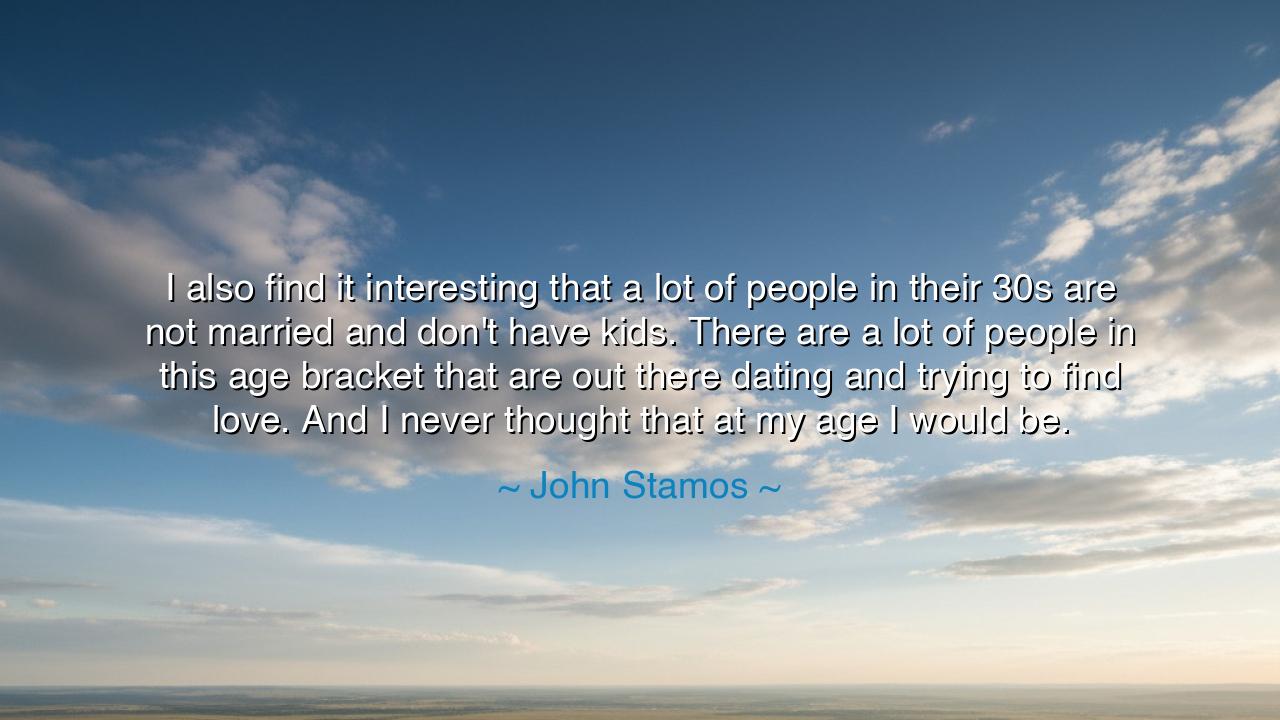
I also find it interesting that a lot of people in their 30s are
I also find it interesting that a lot of people in their 30s are not married and don't have kids. There are a lot of people in this age bracket that are out there dating and trying to find love. And I never thought that at my age I would be.






In the reflective and tender words of John Stamos, there shines the voice of a man awakening to the strange currents of his time: “I also find it interesting that a lot of people in their 30s are not married and don't have kids. There are a lot of people in this age bracket that are out there dating and trying to find love. And I never thought that at my age I would be.” Beneath the calm simplicity of these words lies a profound truth about the shifting nature of love, time, and human expectation. Stamos, who once symbolized youth and charm in the eyes of a generation, speaks here as one standing at the crossroads of what was promised and what is real. He reveals a quiet wonder—that even in maturity, the search for love endures, and that the heart’s longing does not fade with age, but only deepens in its wisdom.
The ancients would have understood this sentiment well. They knew that the seasons of life do not always unfold as one imagines. In the time of youth, we believe that love will come swiftly and certainly—that by a certain age we will have built our home, our lineage, our peace. But as the years turn, many find themselves still seeking, still wandering through the gardens of possibility, still yearning for a hand to hold. John Stamos’s reflection is not one of despair, but of humility—an acknowledgment that love follows its own mysterious rhythm, and that the soul’s timing often defies the plans we make.
To the Greeks, Eros—the god of love—was capricious and untamed. He struck when least expected, cared nothing for age, and answered no logic. The wise philosopher Socrates once said that love is both a teacher and a tormentor, that it humbles even the strong and lifts even the broken. And so, when Stamos confesses that he “never thought” he would still be searching for love in his thirties, he joins the chorus of all who have learned that love does not obey the calendar. It comes when the heart is ready, not when the world expects it.
There is also a quiet commentary in his words about the changing tides of modern life. In earlier generations, to reach the age of thirty without marriage or children was seen as delay, even failure. But now, a new age has dawned—one in which men and women seek not merely companionship, but understanding, not merely marriage, but meaningful connection. The pace of the world has shifted, and so too has the path of love. What once bloomed early now flowers later, sometimes after the first frost of loneliness has passed. Yet as Stamos marvels, there is something beautiful in this: that even in a culture of delay, the heart’s flame still burns, still searches for its reflection in another.
Consider the story of Cato the Younger, the Roman senator known for his virtue and severity. Widowed in middle age, he swore that he would never love again, believing such tenderness unbecoming of his years. Yet when he met the young and brilliant Marcia, his heart stirred once more. Though mocked by his peers, he chose love, defying custom and expectation. His courage reminds us that the soul never grows too old to love, nor the heart too proud to seek connection. What Stamos expresses in modern words, Cato lived in ancient action: that love, whether found at twenty or fifty, is always both surprise and salvation.
John Stamos’s realization is therefore not one of regret, but of wonder. It is the awakening of a man who sees that life does not always follow the storybook path, yet still holds its own poetry. To be single at an age once imagined for family is not to have failed—it is to still be open, still be willing, still be human. For what greater courage is there than to seek love when others have settled for comfort or despair? It is easy to love when young, when life is abundant and unscarred. But to love after experience—to love after loss, delay, or disappointment—is an act of renewal, a defiance of time itself.
So, my children of tomorrow, let this be your lesson: do not measure your worth by the timeline of others. The garden of love blooms differently for each soul. Some find it early, some much later, and some discover it only within themselves. But never close your heart to its arrival. When it comes, no matter the age, it is always timely, always sacred. The world may change, expectations may shift, but the human heart remains eternal in its yearning. Love when it finds you—be it in youth, or in your thirties, or in the twilight of life—and know that in that moment, you are exactly where you are meant to be.






AAdministratorAdministrator
Welcome, honored guests. Please leave a comment, we will respond soon